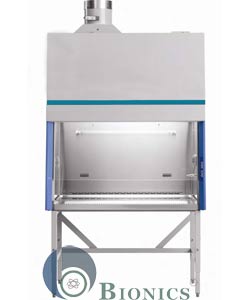Enhancing Laboratory Safety with Class 2 Biosafety Cabinets and Microbiological Protection

Modern laboratories prioritise safety for workers, materials, and environments. Whether it's biotech development, pharmaceutical research, or microbiological analysis, biosafety cabinets play an integral role in contamination prevention and sample integrity.
Class 2 Biosafety Cabinets are widely adopted for offering three-way protection. These units are indispensable tools for pathogen handling and biological research.
Overview of Biosafety Cabinets in Laboratory Environments
Biosafety cabinets are airflow-controlled workspaces engineered for microbiological safety. They use high-efficiency filters to purify air entering and leaving the cabinet.
These units are generally classified into three categories—Class I, Class II, and Class III. Among these, Class 2 cabinets are the most versatile and commonly used.
Why Class II Cabinets Are the Preferred Choice in Labs
Class 2 Biosafety Cabinets offer simultaneous protection for people, processes, and surroundings. They generate a vertical airflow that reduces turbulence and contamination.
Both incoming and outgoing air are HEPA-filtered to maintain sterility and prevent leaks. These cabinets are suited for clinical, research, and pharmaceutical lab applications.
Essential Features of Class 2 Safety Cabinets
A Class 2 microbiological safety cabinet includes several critical technologies such as:
• High-efficiency air filters to ensure clean workspace air
• Uniform downward airflow to protect the sample zone
• Inward airflow to keep aerosols contained
• Built-in UV sterilisation for decontaminating surfaces
• Low sound emissions to reduce fatigue
• Clear front panel for visibility and safety
These elements ensure safety, comfort, and efficiency in day-to-day lab tasks.
Industries and Labs That Rely on Microbiological Safety Cabinets
Class 2 Biosafety Cabinets are widely deployed in clinical labs, vaccine R&D, and academic research. They are critical for DNA/RNA extraction, pathogen culture, and molecular assays.
Hospitals, research labs, Biosafety Cabinets and manufacturing units depend on these cabinets for contamination control.
Advantages of Installing Class 2 Cabinets in Your Lab
Using Class 2 cabinets offers numerous benefits for safety, accuracy, and lab hygiene:
• Reduces the risk of sample cross-contamination and error
• Acts as a barrier between user and biohazard
• Minimises lab contamination and pollution risks
These cabinets support biosafety goals while improving lab productivity.
Regulatory Standards for Class 2 Cabinets
Top manufacturers build Class 2 cabinets in accordance with strict international guidelines. Class 2 units are sub-classified as A1, A2, B1, and B2—based on varying airflow balance and ducting needs.
• Type A2: Ideal for general-purpose labs
• Type B2: Suited for labs dealing with toxic agents
Selecting the right configuration ensures compliance and safety.
Choosing the Right Biosafety Cabinet
Before purchasing, consider:
• The biosafety level required (BSL-1, BSL-2, or BSL-3)
• Ventilation compatibility and placement
• Ease of use, energy efficiency, and upkeep
• Warranty, training, and certification services
Working with reliable manufacturers provides peace of mind and technical guidance.
Installation and Safety Guidelines
For optimal results:
• Avoid placing near doors, vents, or fans
• Ensure annual certification and airflow testing
• Ensure operators follow best practices
Operational best practices include:
• Maintain biosafety gear protocols
• Work calmly to prevent airflow disturbances
• Wipe work areas with disinfectants regularly
• Use UV lights only when cabinet is off and unoccupied
Final Thoughts on Class 2 Biosafety Cabinets
Class 2 biosafety cabinets are vital equipment in laboratories dealing with biohazards. They ensure contamination-free experiments and personnel safety.
From clinical research to vaccine development, Class II cabinets support world-class laboratory practices. When investing in a biosafety cabinet, prioritise compliance, usability, and long-term support—because safe science starts with smart containment.